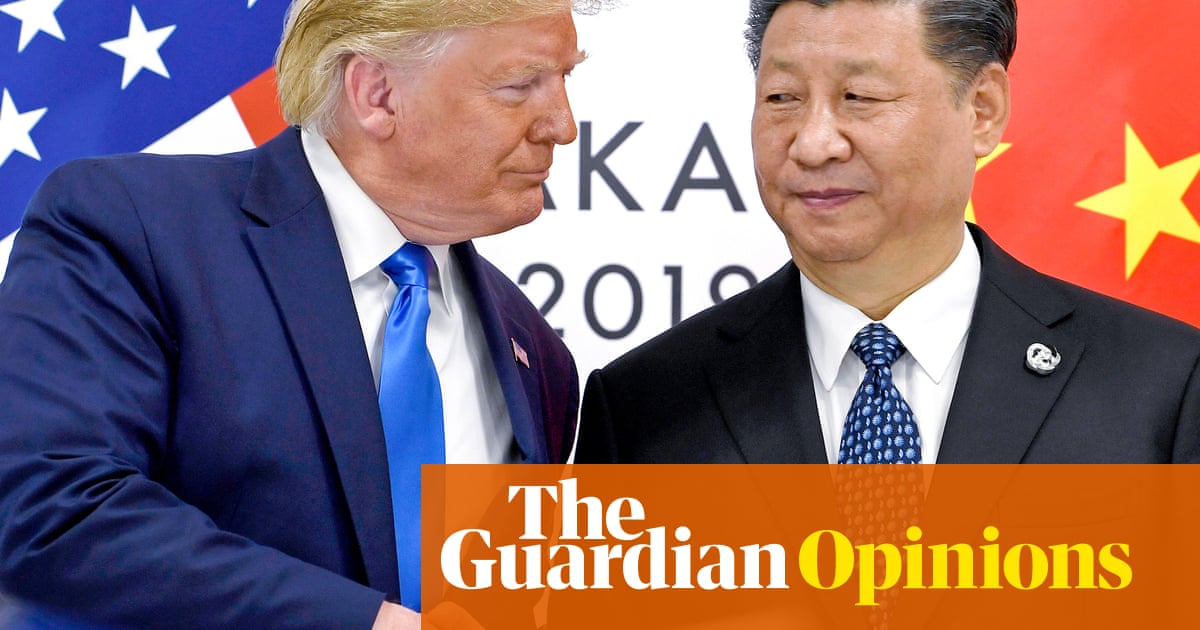The belief that bad things come in threes is an old superstition with scant basis in fact. Still, in these disordered times, it’s natural to wonder whether war in Europe and the Middle East will be followed by war in Asia. Nuclear-armed India and Pakistan, firing off insults and missiles,recently demonstratedhow real that prospect is. Emboldened by its alliance with Russia, North Korea’s unpredictable rogue regime threatens almost everyone.
Yet it is China’s accelerating confrontation with US-backed Taiwan that forms the most alarming panel in this gloomy Asian triptych. China’s president, Xi Jinping, has reportedly told his generals to beready by 2027to conquer the self-governing island, which he regards as stolen sovereign territory. US officials warned last week that China already has sufficientcapability to invadenow, with amphibious landing craft, D-day-style floating docks, paratroopers and expanded air combat and missile forces in a constant state of readiness.
Recent intimidating offshore military exercises – pessimists call them “rehearsals” – and propaganda and disinformation offensives suggest that politically, too, Beijing is preparing for a fight. It denounces Lai Ching-te, elected Taiwan’s president last year, as a pro-independence “destroyer of peace”. For his part Lai is talking tough, describing China as a “hostile foreign force” and enacting “17 strategies” to curb sabotage and spying. A new Taiwanese TV drama,Zero Day, depicts the frightful impact of an invasion on an unprepared nation.
While cross-straitstensions are certainly high, a war between China and Taiwan has often been predicted but has so far been avoided. Since 1979, when the US established diplomatic relations with Beijing and de-recognised Taiwan (while pledging to help it defend itself), peace has held. But calculations change and complacency is dangerous. China is vastly more powerful now than it was 10 or 20 years ago. And for Xi, who turns 72 in June, unification is a legacy project.
A range of other factors may be pushing Xi towards a fateful decision, notably Donald Trump’s strange mix of anti-China aggression and personal weakness. The US president could hike his punitive tariffs on China’s exports at any moment, threatening an estimated 9m manufacturing jobs. His hostility towards the US’s biggest rival is evident, seen again last week indiscriminatory curbson technology transfers and Chinese student visas.
These crude attempts todamage a Chinese economystruggling with sluggish post-Covid growth and high unemployment are akin to holding a gun to Xi’s head. Does Trump realise how deeply provocative this is? Chinese Communist party control ultimately depends not on elections but on economic success and shared prosperity. Deliberately or not, Trump is assaulting the foundations of the CCP’s power and authority.
If pushed too hard, and egged on by hardline nationalist cadres, there’s a risk Xi could call Trump’s bluff with two questions. Does he want a trade war or a real war? Or would he prefer to cut a deal instead – andabandon Taiwan?
Were China to obstruct Taiwanese maritime traffic, launch covert cyber-attacks on Taiwan, or impose a full naval and aerial blockade that fell short of all-out invasion, it could force Trump into a humiliating climbdown. It’s no secret Washington opinion is split overdefending Taiwan militarily. Under Trump, the longstanding policy of “strategic ambiguity” has turned into one of chronic pusillanimity.
Trump doesn’t want a war in east Asia, and Beijing knows it. It also rightly suspects that, like bullies everywhere, his aggressive bluster conceals a coward’s weakness. He refuses to fight for Ukraine, a core western interest, and kowtows to Russian aggression. He’s terrified Israel will start full-scale wars with Iran and Syria, drawing in the US. His policies are driven by self-interest, money and fear, not principles, treaties or laws.
So when people ask if Trump will fight for Taiwan, the answer is not really in serious doubt. In recent months Trump has suggested that Taiwan, like European Nato countries, is exploiting the US security umbrella and not paying enough for its own defence. He has criticised Taipei for supposedly monopolising the semi-conductor market at the expense of US jobs, andimposed tariffs on its exports. None of this inspires confidence in his approach, should a crisis occur.
Some American commentators argue that Taiwan is a bear trap, to be avoided at all costs – music to Xi’s ears. Security researchers Jennifer Kavanagh and Stephen Wertheim recentlyargued in Foreign Affairsthat US leaders need a middle path. “Instead of clarifying its commitment to defend Taiwan, Washington should … downplay the importance of keeping the island out of Beijing’s hands,” they wrote. To many, that will sound like surrender.
Amid this policy confusion, Taiwan presents a vulnerable target. Lai’s tough line is opposed by many in Taipei, where political schisms are purposely inflamed by Beijing.Defence spending is rising, but not fast enough. Promised US weapons don’t arrive. The island’s notional borders are breached at will by Chinese ships and aircraft. Its armed forces and military doctrines require urgent modernisation. These problems may improve over time – which is another reason why Xi may not wish to wait.
Conventional wisdom suggests Beijing prizes geopolitical and economic stability above all else. But what if this comfortable assumption is wrong? Xi surely frames the battle forTaiwanas part of the wider contest between the US and China for regional partners, military superiority and global hegemony. Now a golden opportunity is arising. Thanks to Trump’s chaotic tariffs, domestic firefights, isolationist policies and wanton disruption of European and Asian alliances, the US now looks beatable.
InChina, three is considered a lucky number. Hong Kong returned to the fold in 1997, followed by Macau in 1999. Xi wants to complete the hat-trick before he’s done dictating. Watching Trump’s Crazy Gang White House carry on, China’s leader could be forgiven for thinking Taiwan – and its American protectors – are there for the taking.
Simon Tisdall is a Guardian foreign affairs commentator
